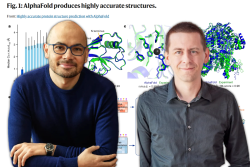
Demis Hassabis from DeepMind Wins Nobel Prize in Chemistry
10.10.2024 15:56 | NewsThe chess world knows Demis Hassabis as a pioneer whose artificial intelligence, AlphaZero, has revolutionized the way we view chess and game AI in general.
However, the scientific community now celebrates another extraordinary achievement – Hassabis and his team have been awarded the Nobel Prize in Chemistry for their breakthrough in predicting protein structures with AlphaFold2.
Demis Hassabis, CEO of DeepMind, along with his colleague John Jumper and David Baker from the University of Washington, has been awarded the Nobel Prize in Chemistry. This achievement is linked to the development of AlphaFold2, an AI that can predict protein structures with remarkable accuracy, solving a problem that science had struggled with for decades.
.jpg)
Lawrence Cooper, Demis Hassabis, Cathy Haslinger and Dharshan Kumaran in around 1986. (source: British Chess News)
Hassabis is best known to chess enthusiasts for the revolutionary projects AlphaGo and AlphaZero. AlphaZero, in particular, shook the chess world by changing the way we play, train, and analyze games. The AI revealed new ways to approach the game and inspired the development of today’s strongest chess engines. The history of neural networks that now dominate chess programs can be traced directly to DeepMind’s research.
Interestingly, Demis Hassabis himself was considered a chess prodigy at the age of 13, boasting a FIDE rating of 2300 and ranking as the second-best junior in the world, just behind Judit Polgar.
However, AlphaZero was never the final goal for DeepMind. Unlike the legendary matches between Deep Blue and Garry Kasparov, AlphaZero demonstrated that AI could be more than just a tool for playing games. It was a proof that AI could learn and tackle complex problems with minimal input. As a result, Hassabis and his team decided to apply these technologies to the field of medicine and biology.
Proteins are the building blocks of life, involved in every biological process. Understanding their structure is key to understanding their function, but determining a protein’s structure had long been a highly complex and time-consuming task. It could take years and hundreds of thousands of dollars to solve just one protein. AlphaFold, however, was able to solve this problem in minutes with astonishing precision.
What does this mean for the world? Protein research has enormous potential in medicine, such as in the development of new drugs. But it goes even further. AlphaFold technology could help in the development of new methods for recycling plastics or protecting agricultural crops from diseases.
Moreover, DeepMind has made its discoveries available to the entire world. Not only have they published their findings in scientific journals, but they also host a free server with more than 200 million protein structures, which scientists around the globe can access and use. This open approach has already benefited more than two million researchers from 190 countries.
Demis Hassabis and John Jumper have now received the highest recognition in the scientific world – the Nobel Prize in Chemistry. “Receiving the Nobel Prize is the honor of my life,” Hassabis said in his statement. “I hope we will look back on AlphaFold as the first proof of AI’s incredible potential to accelerate scientific discovery.”
For chess players, Demis Hassabis remains not only a revolutionary thinker who transformed the game we love but now also a scientist of global significance.
